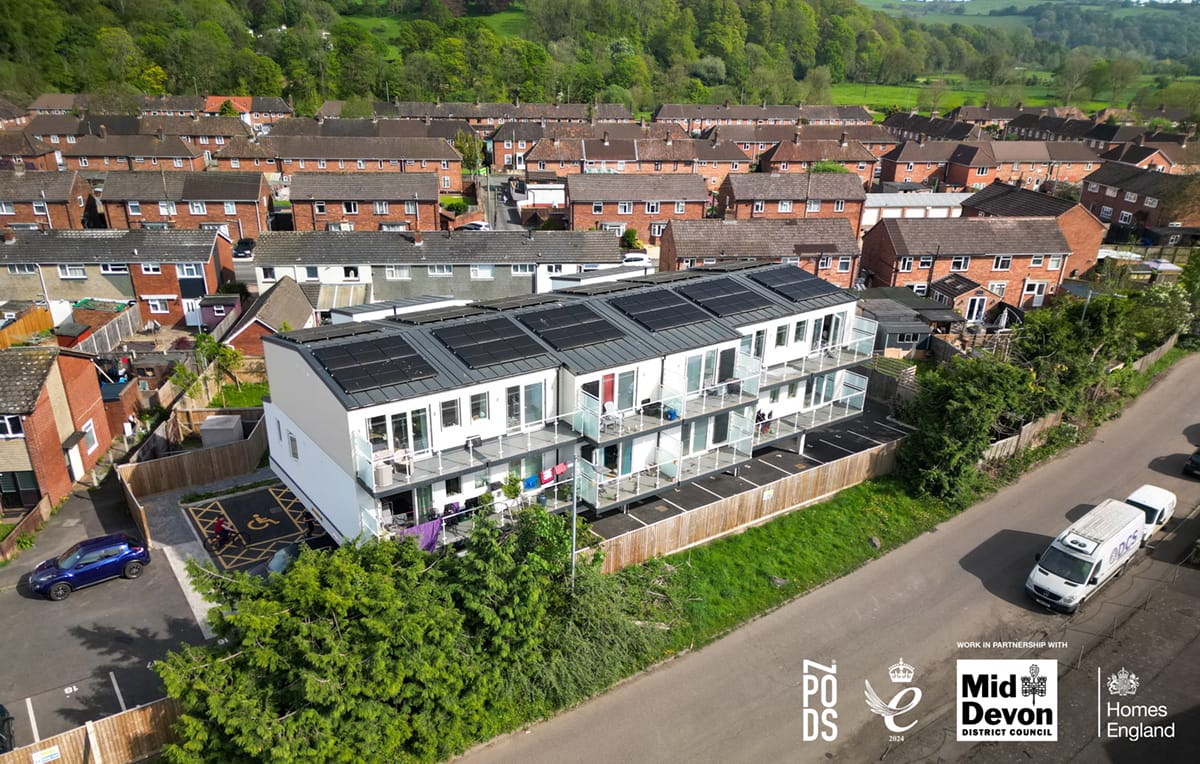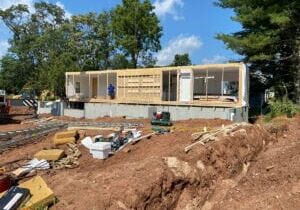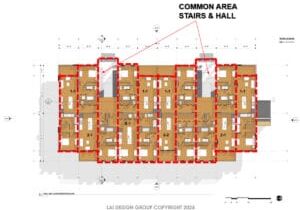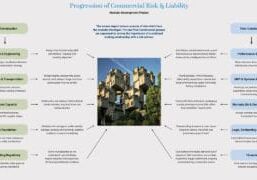Building the Future, Offsite
How Homes England is Unlocking Housing Potential Through Modern Methods of Construction

A modular housing development at Shapland Place in Tiverton, Devon, England. Built by Zed Pods. © ZED PODS Limited.
In the face of a national housing crisis, England stands at a critical inflection point where innovation, scale, and public-private partnerships must converge to meet an urgent need: more homes, and fast.
The UK’s housing backlog is stark. The government has set a five-year target of building at least 1.5 million homes to meet demand – a number far beyond what’s currently being delivered. The situation is exacerbated by labor shortages in traditional construction, supply chain disruptions, and lengthy planning processes.
One of the most promising answers to this challenge isn’t just found onsite, but off. Modular and other Modern Methods of Construction (MMC) have an important role to play in accelerating housing delivery. Homes England, the government’s housing and regeneration agency, is leading the charge.
While the Ministry of Housing, Communities and Local Government (comparable to the U.S. Department of Housing and Urban Development [HUD]) is responsible for designing planning regulations, building codes, and political oversight, Homes England functions as an arm’s-length delivery body. It manages and allocates approximately £20 billion in public funds across England (excluding devolved governments in Scotland, Wales, and Northern Ireland) to drive forward housing delivery goals.
One such goal has been to support modular as a mainstream solution rather than a fringe alternative. At the heart of that effort is Edward Jezeph, who oversees MMC at the agency.
“There is a chronic shortage of housing in the UK,” Jezeph says. “We need to build more and faster. Offsite construction gives us the tools to build high-quality homes more quickly and reliably, especially in the areas where they’re most needed.”
A Strategic Foundation for a More Resilient Housing Market
Homes England is helping reshape the housing market by actively supporting MMC through a strategic blend of land development, financing, and grants.
“Our role is to help create the conditions for a more resilient housing market,” explains Jezeph. “That means investing in innovation and helping newer, offsite-based delivery models get a foothold.”
The agency’s approach include acquiring and preparing surplus public land for sale to developers, with a scoring system that rewards the use of advanced construction techniques. Volumetric modular projects can receive the highest MMC scores, while panelized systems with factory-installed components, such as insulation and windows, also earn recognition.
Homes England also provides critical development financing, especially for small and medium-sized enterprises (SMEs) or modular developers unable to secure commercial loans, and channels affordable housing grants toward projects utilizing MMC. Twenty-five percent of this affordable housing grant funding with Homes England’s strategic partners now mandates the use of these technologies.
The Affordable Homes Program exemplifies this innovation-first strategy; the 25% MMC mandate equates to £1.3 billion for MMC projects and catalyzed partnerships with developers and local authorities willing to trial and scale new approaches.
“We’re not being overly prescriptive,” Jezeph notes. “Some projects need different solutions, but we’re encouraging people to do things differently.”
The goal is not just to fund pilot projects, but to mainstream modular and off-site delivery as viable, scalable solutions to England’s housing needs.
“We’ve learned a lot,” Jezeph adds. “We know where MMC can thrive and what still needs to be addressed, from pipeline uncertainty
to regulatory barriers.”

© ZED PODS Limited.
Local Partnerships, National Potential
While some of England’s progress has been top-down, much of the momentum is now coming from regional collaboration. Through new Strategic Place Partnerships (SPPs), Homes England is working hand-in-hand with Mayoral Combined Authorities and local governments to create regional strategies for housing growth and regeneration, with MMC often at the core.
“These partnerships are about empowering local leaders,” Jezeph says. “They know their communities, they understand the barriers to
growth, and we’re here to help them navigate those barriers.”
One standout example is the Liverpool City Region, which is placing off-site construction at the heart of its long-term regeneration
plans. By aligning public investment, land strategies, and modular supply chains, Liverpool is positioning itself as a northern hub for MMC.
“We’re seeing more areas interested in building local capacity for off-site delivery - whether that’s using regional manufacturers or upskilling their workforce,” Jezeph explains. “This creates jobs, stimulates local economies, and delivers better homes faster. It’s a win all around.”
The Path Ahead: Not Just More, But Better
Even with encouraging signs, Jezeph is realistic about the road ahead. The collapse of several high-profile modular companies in recent years has raised concerns about the sector’s long-term viability.
“These challenges have forced us to think carefully about what a sustainable MMC ecosystem looks like,” he says. “It’s not just about technology or funding, it’s about pipeline certainty, skills development, and investor confidence.”
Homes England is taking steps to address each of those pressure points. By aggregating demand, facilitating data sharing, and supporting research and innovation, the agency aims to create a more stable and resilient modular market.
It also means broadening the definition of success. For Jezeph, it’s not just about how many homes get built, but whether those homes are energy-efficient, beautifully designed, and rooted in thriving communities.
“We have to reframe what we value in housing delivery,” he says. “Speed and scale matter, yes, but so do longevity, sustainability, and pride of place.”
The Power of a “Kit of Parts”
Jezeph explains the power of having a “kit of parts” - or a standardized set of components that can be configured in multiple ways to suit different housing types, tenures, and site conditions for housing delivery rooted in MMC.
“A kit of parts approach brings the best of both worlds,” Jezeph says. “You get the speed and efficiency of off-site construction, but you’re not locked into cookie-cutter design. You maintain flexibility, which is critical when working across diverse geographies and communities.”
Homes England is working with the Ministry of Housing, which is actively developing this approach. The idea is to create a shared language for modular construction where planners, developers, and manufacturers all operate from the same design playbook. That alignment not only streamlines delivery but also reduces costs, improves quality assurance, and builds long-term confidence in the system.
Lessons From International Leaders
To continue to help shape England’s future housing strategy, Homes England has looked to international examples of off-site construction success.
“There’s a lot we can learn from our international peers,” Jezeph notes. “Japan and Sweden are great examples, but I’ve also seen some really inspiring innovation in the USA and Germany.”
In 2023, Jezeph participated in US Government-led research trips to Japan and Sweden. In Japan, where earthquakes and an aging population drive a constant need for housing, modular homebuilding is deeply embedded into the market and consumer culture.
“Japan presents a unique housing landscape,” he says. “You’ve got high consumer demand, stringent seismic regulations, and homes that are often replaced every 30 years. That drives manufacturers to prioritize safety, quality, and mass customization.”
Once the Japanese government approves a housing system, manufacturers can design and produce a wide variety of homes without facing additional regulatory hurdles. The result? Faster delivery, greater flexibility, and a thriving direct-to-consumer model.
In Sweden, the approach emphasizes standardization, energy efficiency, and factory precision. This allows off-site methods to support high-quality, sustainable housing at a national scale.
“Both countries have succeeded in industrializing housing production without sacrificing design or performance,” Jezeph says. “That’s something we’re striving to replicate, while adapting it to England’s own housing landscape.”
Looking Ahead: A Modular Roadmap
So, what does the future hold for modular in England? Homes England sees an opportunity for MMC and modular homes delivered at
scale, integrated into place-based strategies, and supported by systems that ensure quality, affordability, and a strong sense of community. The key to this vision lies in a pragmatic approach, one that balances ambition with realism and innovation with delivery.
“This isn’t about chasing the next shiny object,” Jezeph says. “It’s about using proven technologies to solve real problems, and doing so in a way that benefits everyone from residents to local economies.”
Homes England continues to refine its playbook, support its partners, and champion modular solutions that are grounded in data, driven by demand, and built to last. With growing pressure on housing stock, rising sustainability standards, and the economic imperative to do more with less, the time for modular has never been more urgent or more promising.
“We’re not just building homes,” Jezeph says. “We’re building confidence. We’re building capacity. And we’re building the future.”
About the Author: John McMullen, PCM, is the marketing director for the Modular Building Institute. You can reach him directly at mcmullen@modular.org or on LinkedIn.
More from Modular Advantage
How Stack Modular Is Using AI to De-Risk Mid- to High-Rise Modular Construction
Artificial intelligence is no longer a future concept in modular construction—it is already reshaping how complex buildings are evaluated, designed, and delivered.
Gearing Up for the 2026 World of Modular
The Modular Building Institute (MBI) is bringing its global World of Modular (WOM) conference and tradeshow back to Las Vegas in April, and with it comes some of the industry’s best opportunities for networking, business development, and education.
New High-Rise Modular Apartment in Abu Dhabi Points Toward the Future of Multifamily Construction
Eagle Hills International Properties chose the BROAD Holon Building for a 16-story market rate apartment building in Zayed City, a central business district of Abu Dhabi. The project highlights the potential of the Holon system of volumetric modular construction to accelerate housing delivery.
MBI Announces First Ever Industry Apprenticeship Program in Collaboration with Marshall Advanced Manufacturing Center
MBI recently agreed to partner with Marshall Advanced Manufacturing Center (MAMC) to provide bona fide USDOL-approved apprenticeship programs for the industry.
AoRa Development Aims for New York’s First Triple Net Zero Building Using Modular Methods
More cities are providing funding for newer infrastructure projects as long as they meet sustainability requirements. This is how modular can fit the bill, thanks to its lower waste production.
Developers and Designers: Lessons Learned with Modular Design
Modular construction is attractive to many developers because sitework and module construction can occur simultaneously, shortening the schedule and reducing additional costs.
UTILE: Putting Modular Building on a Fast Track
In Quebec, UTILE is taking the lead in creating affordable modular buildings to help decrease the student housing shortage. During the process, the company discovered what it takes to make the transition to modular building a success.
Sobha Modular Teaches Developers How to Think Like Manufacturers
With its 2.7 million square foot factory in UAE, Sobha Modular is bringing both its high-end bathroom pods to high-end residences to Dubai while developing modular projects for the U.S. and Australia.
RoadMasters: Why Early Transport Planning is Make-or-Break in Modular Construction
In modular construction, transportation is often called the “missing link.” While it rarely stops a project outright, poor planning can trigger costly delays, rerouting, and budget overruns.
Navigating Risk in Commercial Real Estate and Modular Construction: Insights from a 44-Year Industry Veteran
Modular projects involve manufacturing, transportation, and on-site assembly. Developers must understand exactly what they are responsible for versus what they subcontract. Risk advisors should research the developer’s contractors, subcontractors, and design-build consultants—especially the modular manufacturer.










